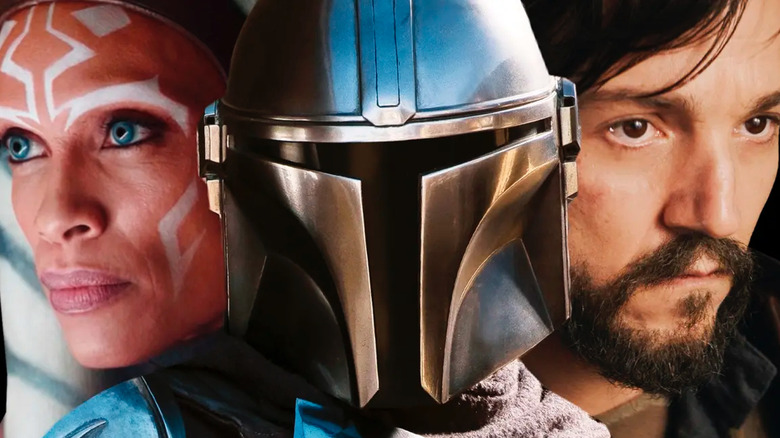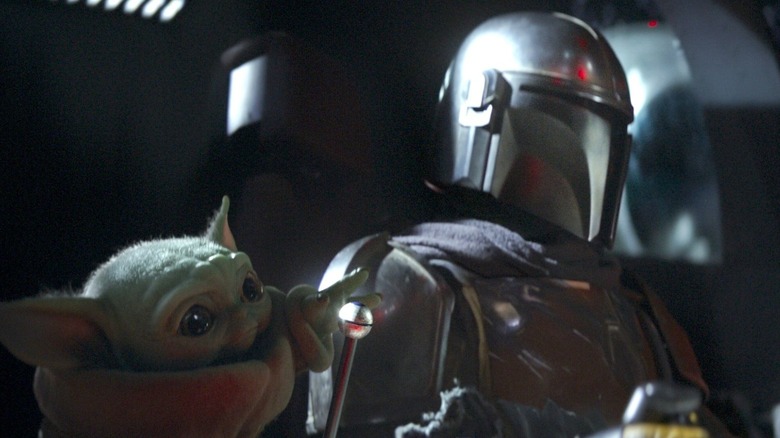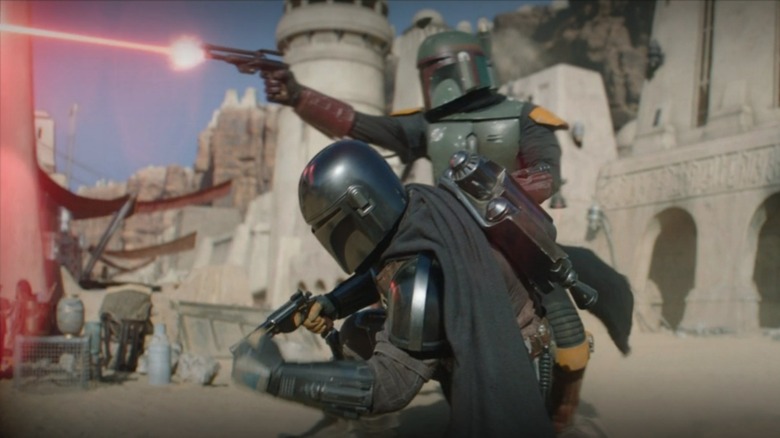The Mandalorian Wants Everything To Be Connected And That's A Big Mistake
The "Star Wars" franchise has always been connected. Even in the very beginning, before the character of Luke Skywalker became fully formed, George Lucas planned to connect the different stories of his galaxy far, far away with the framing device of a "Journal of the Whills." While that concept was ultimately abandoned, Lucas never stopped trying to connect his different "Star Wars" projects.
There were the movies, which went back in time to tell the story of how the galaxy ended up the way it is in the original trilogy, but also the "Clone Wars" cartoons (both of them, including the one he originally wasn't going to be that involved with) were all connected. But the version of "Star Wars" Lucas created and was therefore considered canon is not the same as the Expanded Universe with multiple moving parts and interweaving stories.
Instead, the prequels were, well, direct predecessors to the story of the original trilogy while "The Clone Wars" served to retroactively fill in gaps in what happened in the years between "Episode II" and "Episode III." At times, episodes of the show involved the main characters, but often just told standalone stories that helped paint a picture of the state of the galaxy without being completely necessary to understand the main story of the movies.
But there is a difference between a prequel filling in the gaps and retroactively tying things together, and a show including episodes of a very different show without warning. I'm talking about the incredibly bad decision to turn "The Book of Boba Fett," the first time the unlikely fan-favorite character who died after five minutes on screen finally got a solo adventure, into "The Mandalorian" season two and a half for 2/7s of its runtime.
The blessing and curse of TV
The first season of "The Mandalorian" felt special because it truly felt like the first time a new "Star Wars" project was unconnected to the main story. It did not star a known character, and it was not filling in the gaps from any other movie. Instead, beyond the cuteness of Baby Yoda and the suaveness of Pedro Pascal, the show worked in no small part due to its episodic format.
For the most part, each episode of the first season of "The Mandalorian" was a standalone adventure of the week, not unlike the old-school serials like "Flash Gordon" that inspired George Lucas in the first place. Sure, each new adventure would end on a cliffhanger that teased the next adventure, but for the most part, the actual episodic stories were self-contained. Take "Sanctuary," the Bryce Dallas Howard-directed episode that essentially plays like "Seven Samurai." It doesn't really move the needle in terms of big picture plot, but it delivers a fantastic half-hour of "Star Wars" content.
Once season two arrived, "The Mandalorian" started ramping up its serialization. The individual stories were more focused on the destination rather than the journey, building up to a big plot moment of Luke Skywalker arriving to separate a child from his dad. Worse yet, the season overall felt like a series of backdoor pilots to other shows or other seasons, introducing several characters only to tease their spin-off adventures, from "The Book of Boba Fett" to the "Rangers of the New Republic" show that got canned. These took time away from the story of Din Djarin and Grogu, sacrificing individual quality for overall interconnectivity, becoming the "Avengers: Age of Ultron" of the "Star Wars" franchise.
Episodic storytelling is not a bad thing
This culminated in the travesty that was "The Book of Boba Fett" taking time away from its own story in order to do a tie-in episode of "The Mandalorian." This felt less like a side quest that features in the main plot, and more like they aired the wrong show at the wrong time, Lucasfilm's attempt at pulling a "Marvel's The Defenders."
Making every show in the MandoVerse build-up to some epic event risks what happened to the Netflix Marvel shows. Most of them were individually good, but once they started building up to "The Defenders," they collapsed under the weight of their shared universe. "Andor" didn't succeed only because it wasn't connected to other projects, but that it did not have to worry about bending plotlines or spending time introducing secondary characters for future spin-offs allowed Tony Gilroy and his team to deliver the best "Star Wars" story in years.
Having a plan is not a bad thing. The "Star Wars" sequel trilogy could have used a plan, any plan (or at least a director that respected the movie that became before his and didn't try to eradicate it). But to write the shows around what the other shows are doing in order to build an interconnected TV universe feels like the focus is on the destination rather than the journey, and we all remember how that turned out for "Game of Thrones."


